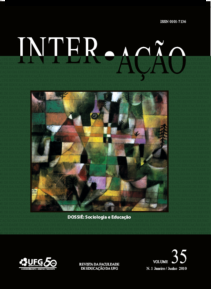AS REDEFINIÇÕES DA RELAÇÃO PÚBLICO/PRIVADO E IMPLICAÇÕES PARA A DEMOCRATIZAÇÃO DA EDUCAÇÃO
DOI:
https://doi.org/10.5216/ia.v35i1.13148Palavras-chave:
neoliberalismo, Relação Público/Privado, educaçãoResumo
Este trabalho trata da concepção de democracia da Terceira Via e de suas implicações para a democratização da educação. Na última década, estudos e pesquisas têm-se dedicado a analisar esse período particular do capitalismo, que, após uma grande fase de expansão iniciada no pós-guerra, vive um período de crise. Suas principais estratégias de superação – neoliberalismo, globalização, reestruturação produtiva e Terceira Via – redefinem o papel do Estado, principalmente para com as políticas sociais, com profundas consequências para a relação público/privado. O objetivo, portanto, é analisar as mudanças ocorridas no papel do Estado, tanto na alteração da propriedade (público não-estatal), quanto o que permanece na propriedade estatal, mas passa a ter a lógica do mercado, reorganizando os processos de gestão (quase-mercado).Downloads
Downloads
Publicado
Como Citar
Edição
Seção
Licença
A Inter-Ação utiliza como base para transferência de direitos a licença Creative Commons Attribution 4.0 para periódicos de acesso aberto (Open Archives Iniciative - OAI). Por acesso aberto entende-se a disponibilização gratuita na Internet, para que os usuários possam ler, baixar, copiar, distribuir, imprimir, pesquisar ou referenciar o texto integral dos documentos, processá-los para indexação, utilizá-los como dados de entrada de programas para softwares, ou usá-los para qualquer outro propósito legal, sem barreira financeira, legal ou técnica.
Autores que publicam neste periódico concordam com os seguintes termos:
1) Autores mantém os direitos autorais e concedem à revista o direito de primeira publicação, com o trabalho simultaneamente licenciado sob a Licença Creative Commons Attribution que permite o compartilhamento do trabalho com reconhecimento da autoria e publicação inicial nesta revista.
2) Autores têm autorização para assumir contratos adicionais separadamente, para distribuição não-exclusiva da versão do trabalho publicada nesta revista (ex.: publicar em repositório institucional ou como capítulo de livro), com reconhecimento de autoria e publicação inicial nesta revista.
3) Autores têm permissão e são estimulados a publicar e distribuir seu trabalho online (ex.: em repositórios institucionais ou na sua página pessoal) a qualquer ponto antes ou durante o processo editorial, já que isso pode gerar alterações produtivas, bem como aumentar o impacto e a citação do trabalho publicado.















